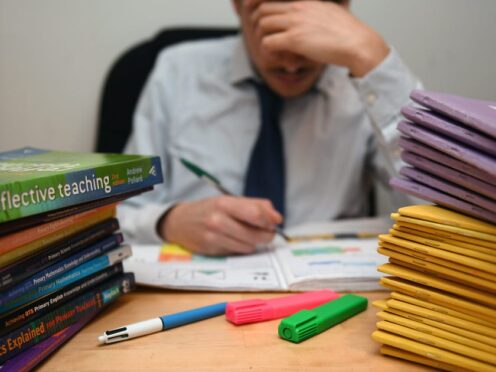
Teachers are taking classes outside their specialism and some schools are dropping subjects entirely because of teacher recruitment and retention issues, a report has found.
The Education Committee has called on the Government to invest in programmes to boost recruitment, training and retention in the teaching profession in a report published on Friday.
Recruitment targets for initial teacher training courses were missed in 10 subjects in 2022/23, according to the committee, with maths, physics and religious education among the subjects affected.
“While there have been welcome increases in absolute teacher numbers, these have not kept pace with pupil numbers, and there is broad agreement from witnesses that there is a crisis of teacher recruitment and retention in England,” the report said.
It added: “We have significant concerns about the negative impacts of subject specific teacher shortages.
“These include compromising the quality of teaching where subjects are being taught by teachers without subject expertise and the reduction of subject provision where schools do not have sufficient specialist teaching capacity.
“We also heard that lack of specialist teachers can have an adverse impact on take-up of certain subjects.”
The committee recommended bursaries developed by the Government to address subject specific teacher shortages be expanded and increased, and that programmes allowing for alternative routes into the profession are reinstated.
Education Committee chairman Robin Walker said: “Ministers need to rethink the recent, short-sighted cuts to programmes that promoted career development and different routes into the profession.
“Without them we will keep on missing targets for recruiting specialist teachers in nearly every subject, forcing more teachers to take on classes outside of their specialism and thereby undermining the quality of education children receive.”
According to the committee, many current teachers singled out “excessive workloads” rather than pay as the biggest factor pushing them to leave the sector.
In the Department for Education’s (DfE) 2022 Working Lives of Teachers survey, 92% of participating teachers cited workload as a reason to quit the profession, while 57% cited pay.
Charity Education Support told the committee that additional workload can be “associated with accountability measures, particularly Ofsted inspections”.
The report recommended the department increase “myth-busting efforts” around Ofsted to “reduce accountability related workload”.
Teachers were found to be dedicating more time to offering students mental health support and family conflict resolution since the pandemic, with Education Support also saying teachers were helping children to combat the cost-of-living crisis by buying meals and washing uniforms.
“We also heard that ‘overspill’ from wider social problems is heaping extra stress on teachers, be it children’s mental health, behaviour, even cases of teachers helping families resolve disputes,” Mr Walker said.
“Teachers must be able to rely on adequate local services that they can signpost to.”
The committee recommended the DfE defines the remit of schools’ and teachers’ responsibilities and ensures “wraparound support” delivered by appropriate organisations is made more widely available.
Pupil behaviour has also worsened since the pandemic, according to the report, which can “discourage” people from becoming teachers and make existing teachers think about leaving the profession.
It was recommended that the Government expand its Behaviour Hubs programme, which helps school leaders to create positive school environments, to allow more schools to benefit from it.
The report also said teacher salaries “need to be attractive” to boost recruitment and that while the introduction of a £30,000 starting salary was a welcome step, the figure will have to increase in the coming years “if it is to remain competitive”.
The Association of School and College Leaders said the Education Committee identified the problem “but not the solution”.
General secretary Pepe Di’Iasio said: “Piecemeal incentives to get and keep people in teaching are not working, and excessive workload can only be fully addressed by schools having enough money to afford enough staff, which is currently not the case.
“This comes down to funding, for pay which is sufficient to attract and retain teachers, and to properly resource schools. But the financial position is actually getting worse, not better, with many schools setting deficit budgets while they make more cuts.
“You cannot turn around an ocean liner without enough fuel, and the current government just does not understand that.”
Paul Whiteman, general secretary at school leaders’ union NAHT, said: “Above all the Government needs to act decisively to address the ‘big ticket’ issues which are making it harder than ever for schools to attract and keep the teachers they need, including not only workload, but the damage inflicted by the brutal Ofsted inspection regime and years of real-terms pay cuts.”
A DfE spokesman said: “There are more teachers now, record numbers of teachers in our schools, with over 468,000 in the workforce, a 27,000 increase since 2010, and 59,600 more teaching assistants since 2011.
“To continue attracting the best and brightest, we offer bursaries and scholarships of up to £30,000 tax-free in the subject areas where they are needed most, including physics and maths, and opening new routes into the profession, such as through teacher degree apprenticeships.
“Last autumn the Government delivered on its commitment, giving all new teachers a starting salary of at least £30,000. We are also taking steps to support teachers’ wellbeing and ease workload pressures, including plans to support schools to reduce working hours by five hours per week.”

Enjoy the convenience of having The Sunday Post delivered as a digital ePaper straight to your smartphone, tablet or computer.
Subscribe for only £5.49 a month and enjoy all the benefits of the printed paper as a digital replica.
Subscribe